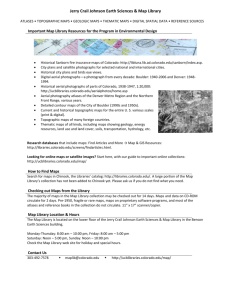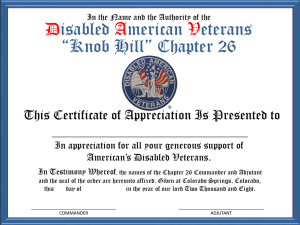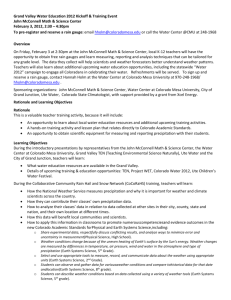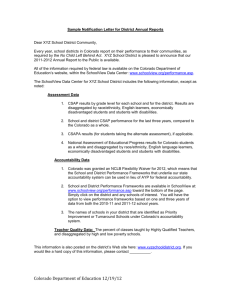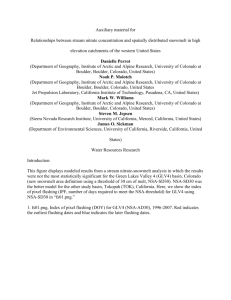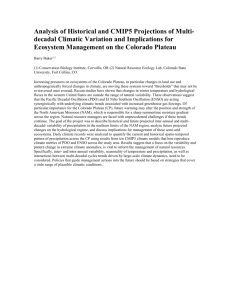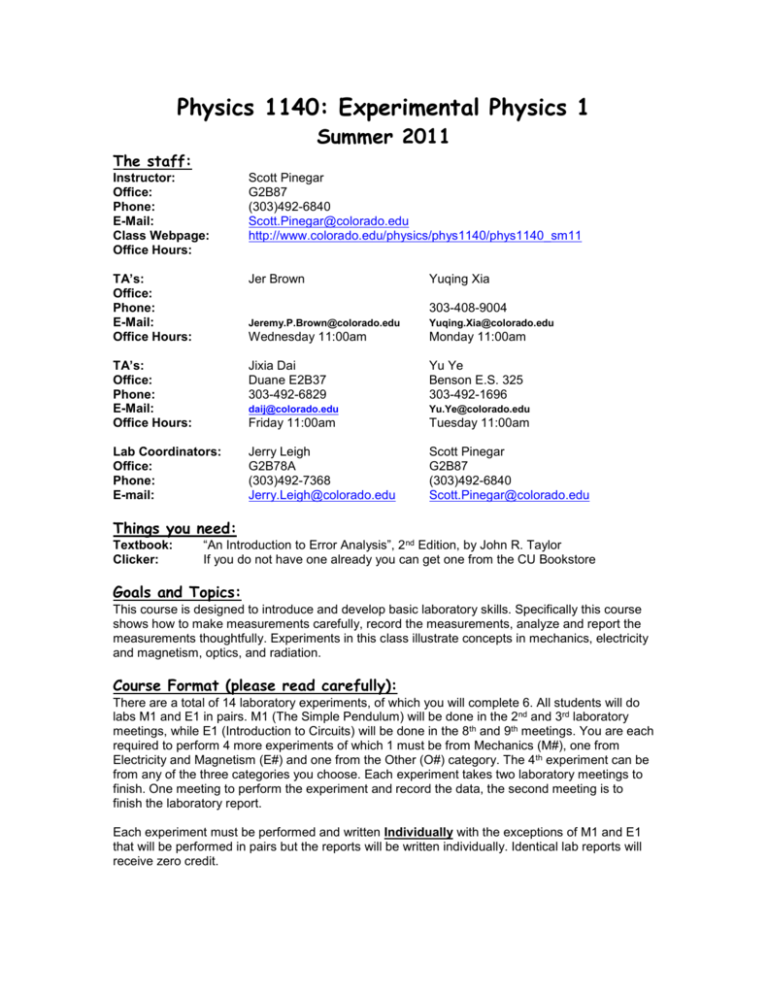
Physics 1140: Experimental Physics 1
Summer 2011
The staff:
Instructor:
Office:
Phone:
E-Mail:
Class Webpage:
Office Hours:
Scott Pinegar
G2B87
(303)492-6840
Scott.Pinegar@colorado.edu
http://www.colorado.edu/physics/phys1140/phys1140_sm11
TA’s:
Office:
Phone:
E-Mail:
Office Hours:
Jer Brown
Yuqing Xia
303-408-9004
Jeremy.P.Brown@colorado.edu
Yuqing.Xia@colorado.edu
Wednesday 11:00am
Monday 11:00am
TA’s:
Office:
Phone:
E-Mail:
Office Hours:
Jixia Dai
Duane E2B37
303-492-6829
Yu Ye
Benson E.S. 325
303-492-1696
daij@colorado.edu
Yu.Ye@colorado.edu
Friday 11:00am
Tuesday 11:00am
Lab Coordinators:
Office:
Phone:
E-mail:
Jerry Leigh
G2B78A
(303)492-7368
Jerry.Leigh@colorado.edu
Scott Pinegar
G2B87
(303)492-6840
Scott.Pinegar@colorado.edu
Things you need:
Textbook:
Clicker:
“An Introduction to Error Analysis”, 2nd Edition, by John R. Taylor
If you do not have one already you can get one from the CU Bookstore
Goals and Topics:
This course is designed to introduce and develop basic laboratory skills. Specifically this course
shows how to make measurements carefully, record the measurements, analyze and report the
measurements thoughtfully. Experiments in this class illustrate concepts in mechanics, electricity
and magnetism, optics, and radiation.
Course Format (please read carefully):
There are a total of 14 laboratory experiments, of which you will complete 6. All students will do
labs M1 and E1 in pairs. M1 (The Simple Pendulum) will be done in the 2nd and 3rd laboratory
meetings, while E1 (Introduction to Circuits) will be done in the 8th and 9th meetings. You are each
required to perform 4 more experiments of which 1 must be from Mechanics (M#), one from
Electricity and Magnetism (E#) and one from the Other (O#) category. The 4th experiment can be
from any of the three categories you choose. Each experiment takes two laboratory meetings to
finish. One meeting to perform the experiment and record the data, the second meeting is to
finish the laboratory report.
Each experiment must be performed and written Individually with the exceptions of M1 and E1
that will be performed in pairs but the reports will be written individually. Identical lab reports will
receive zero credit.
There are three different stations for each experiment; therefore, to ensure that the lab you want
is available, you must reserve the lab by signing the reservation book in the lab. Only sign up for
one experiment at a time after you have finished with your current experiment.
You are to complete your lab write-ups entirely in class. Lab notebooks may not be removed
from the 1140 lab under any circumstances. All of your graphing and data analysis will be done
using a piece of software called MathCad, which is loaded on the computers in the lab. Your
completed report will consist of a MathCad document and a few pages from your notebook. A
sample report is on the bulletin board in the lab as a reference and you TA and the Lab
Coordinators will be happy to help you with any questions. Also, check the lab report score sheet
at our class website to see what TA’s will be looking for when they grade your lab report.
In order to complete the experiment and write-up during your lab periods, it is essential that you
carefully study the lab instructions and complete the pre-lab questions before coming to lab. The
pre-lab questions must be turned in to your TA’s slot in the brown homework cabinet in the 1140
lab room G2B66 before you begin working on the experiment. If you desire extra time to
complete your lab, you can work any time in the 1140 lab room between 8:00am and 5:00pm
Monday through Friday. This extra time cannot be used in place of your regular class time, but
only in addition to your regularly scheduled class time. The TA’s will keep track of your
attendance in the lab. Laboratory reports will be due by 4:00pm, two working days after the
second scheduled lab session for that lab. So, for example the second scheduled lab is on a
Wednesday, then the report must be turned in to your TA’s box by Friday at 4:00pm. Due to the
increased pace of this class during the summer, no late work can be accepted so please stay on
track with your due dates. Please talk to your TA, as soon as possible, if you have special
circumstances that prevent you from completing lab reports on time.
Grading:
Your final grade will consist of the following 4 parts.
1.) 5 Homework assignments
2.) 6 Completed laboratory reports
3.) Pre-lab questions
4.) Quizzes
5.) Clicker questions
Total:
20%
60%
10%
5%
5%
100%
The average grade for this course is usually around a B. At the end of the semester the TA’s will
have the option of raising or lowering your final grade by ½ of a letter grade, based on your inclass performance. Reasons for lowering your grade include: chronic tardiness or unexcused
absence, lack of familiarity with the lab instructions, poor understand of the physics principles
used. Reasons for raising the grade include: asking insightful questions, unusually high level of
preparedness, excellent lab technique, etc… Under normal circumstances, the grade will not be
changed.
University Policies:
Disabilities: If you qualify for accommodations because of a disability, please submit to me a
letter from Disability Services in a timely manner so that your needs will be addressed. Disability
Services determines accommodations based on documented disabilities. Contact (303)492-8671,
Willard 322, and http://www.colorado.edu/disabillityservices. If you have a temporary medical
condition or injury, see guidelines at
http://www.colorado.edu/disabilityservices/go.cgi?select=temporary.html.
Religious Observances:
Campus policy regarding religious observances requires that faculty make every effort to deal
reasonably and fairly with all students who, because of religious obligations, have conflicts with
scheduled exams, assignments or required attendance. In this class you should notify me at least
two weeks before any anticipated class absences. See full details at
http://www.colorado.edu/policies’fac_relig.html.
Classroom Behavior:
Students and faculty each have a responsibility for maintaining an appropriate learning
environment. As part of the responsibility, you are expected to turn off cell phone ringers during
class, not use laptop computers, cell phones, pagers, or other electronic devices and not read
newspapers or magazines in class. Students who fail to adhere to behavioral standards may be
subject to discipline. Faculty have the professional responsibility to treat students with
understanding, dignity and respect, to guide classroom discussion and to set reasonable limits on
the manner in which students express opinions. See policies at
http://www.colorado.edu./policies/classbehavior.html and at
http://www.colorado.edu/studentaffairs/judicialaffairs/code.html#studentcode. Professional
courtesy and sensitivity are especially important with respect to individuals and topics dealing
with differences of race, culture, religion, politics, sexual orientation, gender variance, and
nationalities. Class rosters are provided to the instructor with the student’s legal name. I will
gladly honor your request to address you by an alternate name or gender pronoun. Please advise
me of this preference early in the semester so that I may make appropriate changes to my
records.
Equity and Discrimination:
The University of Colorado at Boulder policy on Discrimination and Harassment, the University of
Colorado policy on Sexual Harassment and the University of Colorado policy on Amorous
Relationships apply to all students, staff and faculty. Any student, staff faculty member who
believes s/he has been the subject of sexual harassment or discrimination or harassment based
upon race, color national origin, sex, age, disability, creed, religion, sexual orientation, or veteran
status should contact the Office of Discrimination and Harassment (ODH) at (303) 492-2127 or
the Office of Judicial Affairs at (303) 492-5550. Information about the ODH, the above referenced
policies and the campus resources available to assist individuals regarding discrimination or
harassment can be obtained at http://www.colorado.edu/odh.
Academic Honesty:
All students of the University of Colorado at Boulder are responsible for knowing and adhering to
the academic integrity policy of this institution. Violations of this policy may include: cheating,
plagiarism, aid of academic dishonesty, fabrication, lying, bribery, and threatening behavior. All
the incidents of academic misconduct shall be reported to the Honor Code Council
(hono@colorado.edu; (303) 735-2273). Students who are found to be in violation of the academic
integrity policy will be subject to both academic sanctions from the faculty member and nonacademic sanctions (including but not limited to university probation, suspension, or expulsion).
Other information on the Honor Code can be found at
http://www.colorado.edu/policies/honor.html and at
http://www.colorado.edu/academics/honorcode.


